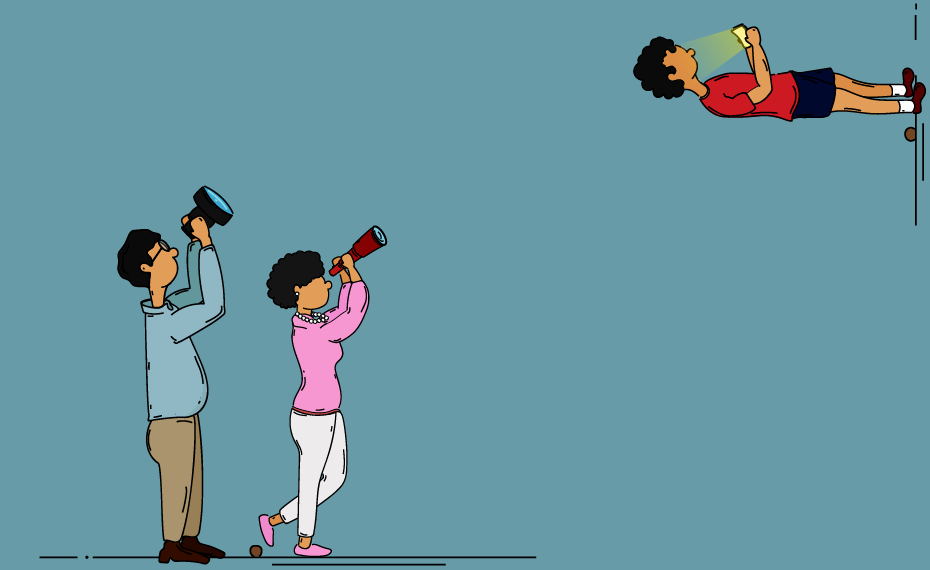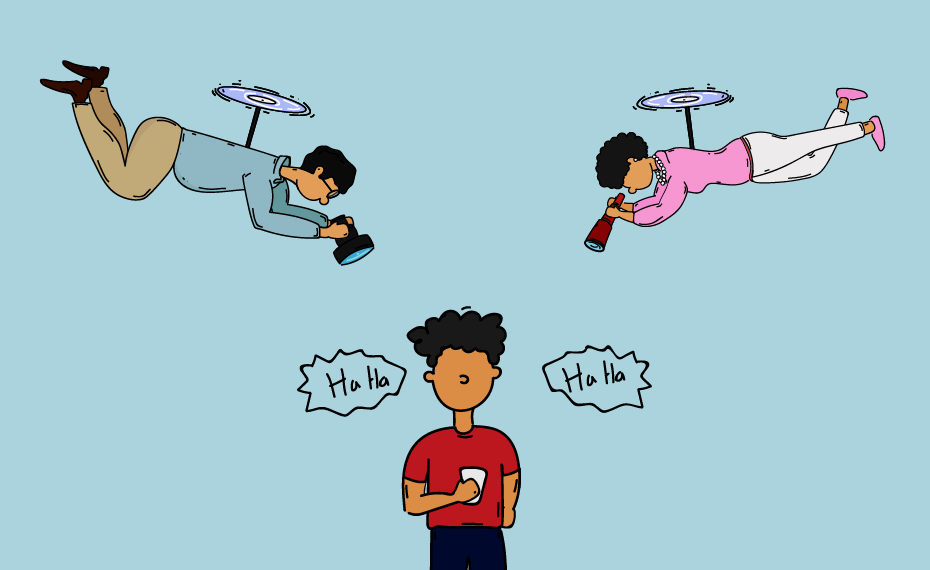A Helicopter, what!!!
As a parent, it is natural to want what is best for your child. And that also, while keeping them out of harm’s way. And sometimes this “act of love and support” goes overboard and ends up harming your child more. Helicopter parents are constantly involved in every part of their child’s life. The constant feeling of “hovering around” by over focused parents is the origin of the term. A helicopter parent tries to monitor everything that their child does, from school, play time, as well as leisure time. While it starts as being a supportive and attentive parent, it can easily cross over the line. And you can become an overprotective helicopter parent.
This kind of parent-child relationship can easily influence the social development of your child. As a parent, raising responsible kids is our duty. However, parents want to raise a better version of themselves in their children, so they often commit to overparenting and become helicopter parents. Becoming helicopter parents is too easy in this age, where we know exactly where our children are at all times. Home surveillance cameras, GPS enabled watches, mobile phones, tracking apps etc are some of the electronic tools used by parents nowadays to monitor their kids.
Effects of helicopter parenting on your child
When we talk about the effects of being helicopter parents on children, the drawbacks are not only behavioural. It affects the cognitive and social development of a child. Children brought up by helicopter parents have self-esteem issues, lack of confidence and high dependency on others. They are never able to depend on themselves and lack many social skills. Children brought up in such a household may grow up with a sense of entitlement. They are always more withdrawn. Therefore, in the worst cases, it can even lead to the development of anxiety or depression
10 Signs of being helicopter parents
1. Being overprotective
One of the telltale signs of being a helicopter parent is being overprotective. When it comes to your child, you cannot help but take precautions about everything so that they don’t hurt themselves. You don’t let them go play in the playground because they might get hurt. Or you don’t let them near the kitchen area in case they might come in contact with knives. There are many other instances too. If you get anxious and feel your heart dropping at the thought of your child getting just a minor scratch, you might need to rework on your parent-child relationship.
2. Being overassertive
You are definitely a helicopter parent if you try to have your way with everything when it comes to your child. When your child is getting dressed, you try to make them wear the outfit that you choose. Although your child hates the outfit. You try to make them pick up a hobby like singing or playing the guitar, just because you were not able to learn it in your childhood. We often try to model our children to be the better version of ourselves. And in that process, we stop bothering to ask their own preference
3. Fighting your children’s battle for them
When your child is fighting and the first thing you do is to scold the other child and then complain to their parents, you have the symptoms of helicopter parenting. If you try to face every difficulty that your child is facing and solve it for them, they will never learn to depend on themselves.
4. Over-criticizing your child
A helicopter parent is always busy trying to find areas that can be improved when it comes to every aspect of their child’s life. You always find mistakes in what your child has written or drawn. You always scold him for the way he is holding his cricket or the way they make an omelette. If you always point out the weaknesses in your child, they will never feel confident about themselves. Hence, they will lack in self-esteem.
5. Over-expecting from your child
When you always try to push your child to a pedestal you end up over-expecting from them. You want them to score nothing less than an A in all their exams. As a parent, you expect your child to at least finish 2nd in the race. You also want your child to answer all the words correctly in the dictation that you just conducted. If you set the bar too high for children, they might be scared of failure. They can even develop anxiety issues. Therefore, over-expecting from your child can stunt their social development.
6. Involving yourself deeply in your child’s school life
If you call your child’s school more than two times a week, then your parent-child relationship is that of helicopter parenting. You insisting to your child’s class-teacher to always make him sit in the front. You constantly pester the teachers about how your child is doing in class or how to do a particular homework. When you complain to the school if your child is not selected for a competition or given a responsibility. If a parent is too involved in their child’s school life, the child will never be able to gain the kind of holistic development that is provided by the school.
7. Constantly monitoring your child
If you have cameras installed in your child’s room, it is time to take it down by a notch. A helicopter parent, just like the name suggests, finds anxiety building up inside them if they don’t monitor their children’s situations. You calling your child up always and asking where they are. You telling his friends and teacher to always keep an eye out for your child. When you supervise and constantly check their phones and internet activity etc. A child constantly monitored will never be freely able to express themselves.
8. Showing over compassion
if you dote on your children too much you end up spoiling them. As a parent, it is important to shower your child with love and support. However, anything excess is never good. If you buy whatever your child demands or if you give in to everything they say, they will always be dependent on you. Your child will never be able to stand up for himself if you coddle him too much with love and affection.
9. Being over-authoritative
In an authoritarian style parent-child relationship, it is common for parents to turn into helicopter parents. When you set up too many rules and curfews and don’t allow them to go out with friends. Grounding your child often or punish them for their mistakes. Or, when you don’t allow them to have sleepovers. If you are too strict with your children and rule them with an iron reign, it is common for the parent-child relationship to be sour.
10. No concept of personal space and boundaries
A helicopter parent has no concept of personal space and hovers around their children all the time. It is important to give children some space to breathe, think and feel. As a parent, if you always force your child to share everything, they will feel anxious. A child who grows up in a household where there is no concept of boundaries will always be vulnerable to the outside world. Hence, they will lack proper social skills.
Additional Reading:
How to increase conventration and focus
8 tips to bring up a creative child
How to stop being a Helicopter Parent?

If you are a religious practitioner of one of the examples mentioned above, then it’s about time you change your ways. Here are a few parenting tips which will help you stop being a helicopter parent and help you re-establish the parent-child relationship.
Raising them responsible
Give your child enough responsibility according to their age. You can start off by giving them simple chores and tasks from a young age. Then accordingly proceed by age from them. By doing so, your child will feel a sense of responsibility and commitment which are important life skills. It will make them competent and they will not develop a sense of entitlement while growing up.
Communication
As a parent, it is important that you have healthy interaction and communication with your child. You need to give space to your child so that once they feel comfortable enough, they can share things with you. Children should feel that their home and parents are a safe bubble where they can share their heart’s content. As a parent, you need to always keep an open mind. You also need to provide a judgment-free environment for your child’s social development.
Be an active listener
It is important to always hear out what your child has to say. Active listening is a very important aspect of a good parent-child relationship. Helicopter parents often fuss over everything about their child but they often forget to listen to them. Children should feel that they are able to comfortably communicate with their parents. This will help in developing their social skills and act as a catalyst for moral boosting.
Let them solve their own problems
One of the most important parenting tips for helicopter parents is that they let their child face his problems. If you constantly fight your child’s battle for them, they will never become independent. You need to talk to your child and morally support them but at the end of the day, you need to ask them their solutions to the problem that they face. You can further help your child by teaching them proper problem-solving skills and rationalization skills.
Be a passive yet supportive parent
In order to have a healthy parent-child relationship, you need to stop being an over-focused parent. Helicopter parents often cross the boundaries and start over parenting their children. In order for your child to grow up healthy with proper social skills, it is important for you to stop being actively involved in every aspect of their lives. Being a parent who provides their children with the moral support that they need will end up raising responsible kids.

